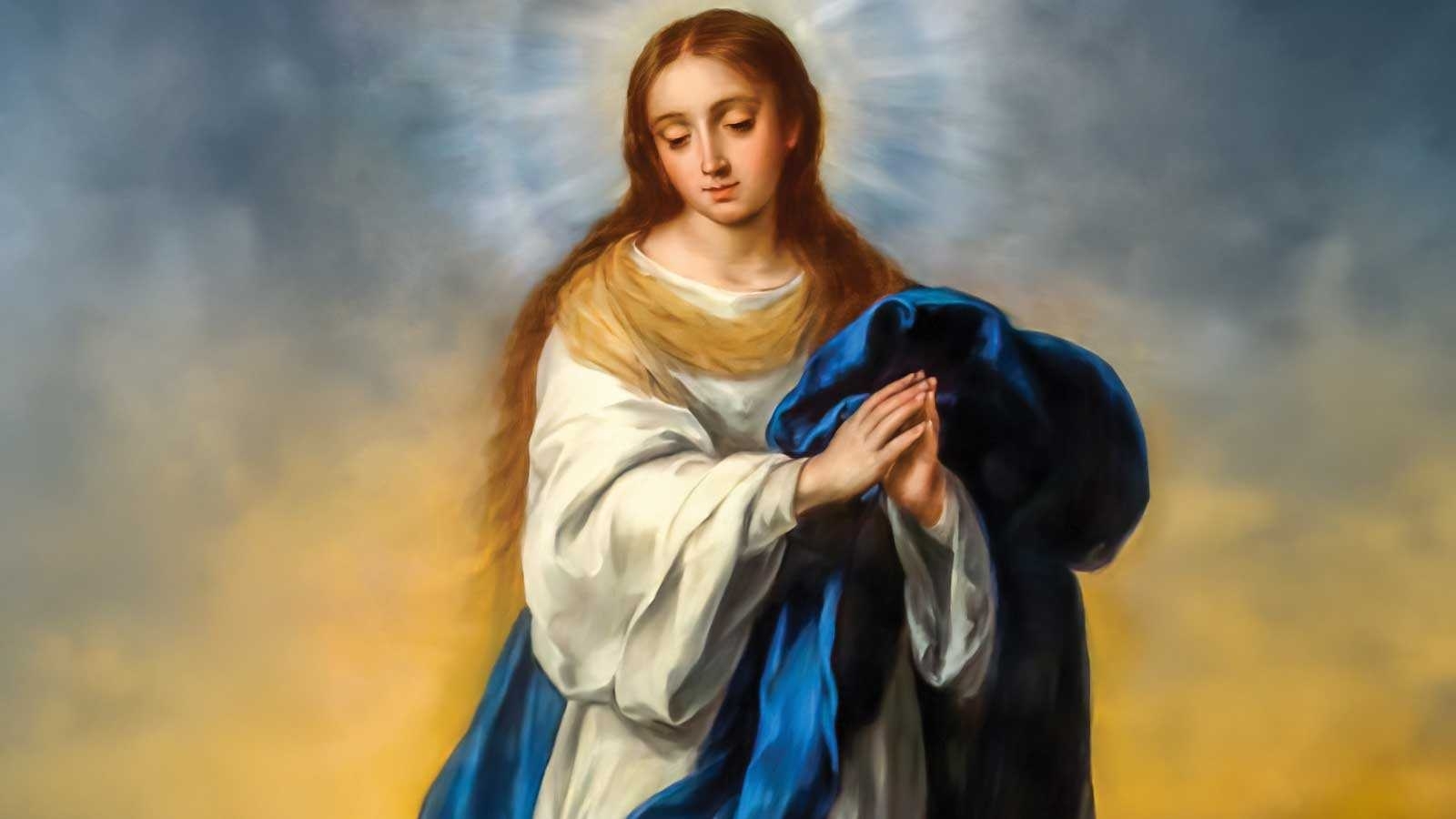
TOPICS:
Holy Intransigence: An Aspect of the Immaculate Conception
Jul 21, 2025 / Written by: Professor Plinio Corrêa de Oliveira
The Immaculate Conception is a theme rich in beauty, full of poetry, worthy of attracting and making the talent of the greatest poets and artists shine.
Marian Piety, the Key to Victory
Piety is the key issue in the life of the Church. Properly understood, piety should not be the routine and sterile repetition of formulas and acts of worship. A gift descended from Heaven, true piety is capable of regenerating and leading souls, families, peoples and civilizations to God.
Now, in Catholic piety, the key issue is devotion to Our Lady. For if she is the channel through which all graces come to us, and it is through her that our prayers reach God, the great secret to total victory in the spiritual life consists in being intimately united to Mary.
Thus, there is no work that is more essential, no task more fruitful and no greater glory than the spreading of Marian piety. The Pontificate of Pius XII was all resplendent in this glory. In the rich, tragic and exciting years of his Pontificate, he had many opportunities to provide remarkable benefits to humanity. It is enough to see this through the newspaper collections of those decades. When one day, the archives are opened and the history of the Second World War and all that followed is written, this truth will be even more deeply rooted. But however great the merits and glories that history will inventory, there will be no difficulty in saying which is the greatest. It will undoubtedly be the profoundly Marian stamp of the reign of Pius XII. The definition of the dogma of the Assumption would be enough to glorify Pope Pius XII to the most remote posterity.
But the Assumption is not a single stone, a solitary brilliant gemstone, in the annals of Pius XII. It shines in a constellation of other Marian lights: the Apostolic Constitution Bis Saeculari, the reinvigorating of Marian congregations, the canonization of Saint Louis Grignion de Montfort, the consecration of Russia and the world to the Immaculate Heart of Mary, the coronation of Our Lady at Fatima and finally the Holy Marian Year commemorating the centenary of the Dogma of the Immaculate Conception. All of this helps one to understand the specific brilliance of the Marian work of Pius XII. The teachings and example of the Holy Father, therefore, encourage us to increase our piety towards the Blessed Virgin.
This year, we are invited in a special way “sentire cum Ecclesia” (to think with the Church), meditating on the Immaculate Conception, which is the mystery that the Vicar of Jesus Christ is offering to our devotions. It is a theme rich in beauty, full of poetry, worthy of attracting and making the talent of the greatest poets and artists shine. But for this very reason, it is also a theme in which the Brazilian temperament, naturally prone to digressions, runs the risk of remaining only in poetry.
Now, every emotion—in piety more than in any other field—is only legitimate and salutary to the extent that it is based in truth and has truth as its measure. In such a way, it is nothing in our sensibility other than the harmonious, proportionate, coherent vibration of the truth that our intellect has contemplated. It seems, therefore, opportune to meditate on the Immaculate Conception without any literary pretension, solely focused on the application of the truth contained in the dogma.
The Gentiles and the Cycle of Moral Decadence
Before Jesus Christ, humanity was composed of two clearly distinct categories: the Jews and the Gentiles. The former, constituting the Chosen People, had the Synagogue, the Law, the Temple and the Promise of the Messiah. The latter, given to idolatry, ignorant of the Law, lacking knowledge of the true Religion, lay in the shadow of death, waiting without knowing it, or sometimes moved by a secret impulse, for the Savior who was to come. Among the Gentiles, two categories could still be distinguished: the Romans, who dominated the universe, and the people who lived under the authority of the Empire. An analysis of the time in which the coming of the Messiah occurred involves examining the situation in which each of these fractions of humanity found itself.
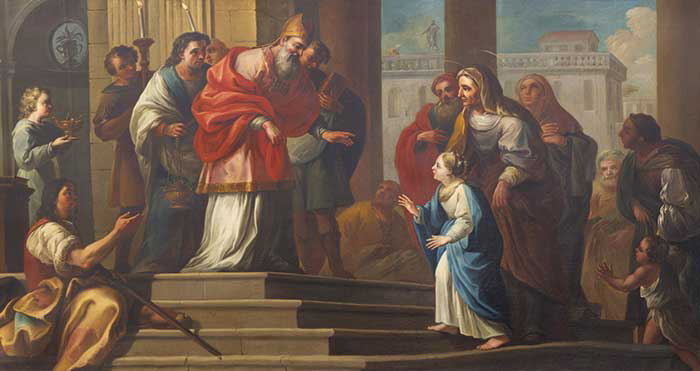
Much is said about the military valor of the Romans and the brilliance of their conquests. There is much to admire in them from this point of view. But a careful consideration of all the historical circumstances forces us to recognize that, although the Romans made great conquests, the peoples they subdued were, for the most part, old and worn out, dominated by their own vices, and therefore doomed to fall under the gauntlet of the first adversary who opposed them. This statement is as valid for Greece as for the nations of Asia and Africa, with the possible exception of Carthage.
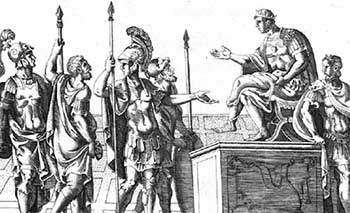
What had reduced so many peoples who were once dominant and full of glory to this state of weakness? Moral corruption. The historical trajectory of all of them is the same. At first, they are in a semi-primitive stage, leading a simple life, dignified by a certain natural rectitude. From this comes the strength that allows them to dominate their neighbors and build an empire. But with glory comes wealth, with wealth comes pleasure and with these comes debauchery. Debauchery, in turn, brings with it the death of all virtues, social and political decadence, and the ruin of the empire.
And so one after another appeared on the historical scene, rising to their peak and diminishing to their demise the great peoples of the East. All the civilized nations that Rome conquered had gone through the various stages of this cycle. She herself went through them in her turn. The family virtues of the Rome of royalty and the aristocratic republic gave her greatness. At the end of the republic, luxury began to corrupt characters and decline began. The Empire, which at its beginning was a magnificent sunset, gradually turned into an inglorious and dusky twilight.
[I]t is permissible to ask what would have happened in the Mediterranean world when Rome had completed its decline, if the Word of God had not become incarnate.
At the moment when Rome was still entering the golden phase of this downward path, Jesus was born. Historical hypotheticals are dangerous. In any case, it is permissible to ask what would have happened in the Mediterranean world when Rome had completed its decline, if the Word of God had not become incarnate. Until then, each civilized nation had passed on the legacy of its culture to the victor. The Persians, for example, were nourished by Assyrian-Babylonian and Egyptian cultures. The Greeks were nourished by Egyptian and Persian culture, and the Romans by Greek culture. Thus, moving from East to West, civilization was transmitted.
Once Rome was extinct, in whose hands would the legacy remain? In the hands of the barbarians. But history proves that without the Church, they would not have become civilized at the time of the invasions, and thus, without Jesus Christ, the fall of Rome would have been the collapse of the West. With the decline of Rome, which had already begun before Christ, the entire West threatened to collapse. It was the end of a culture, a civilization and a historical cycle.
It was the end of the world.
Two Tendencies Among the Chosen People
Now, the Chosen People were also at an end. Two tendencies had always been evident within them. One wanted to remain faithful to the Law, to the Promise, to its historical vocation, trusting entirely in God. Another, however, with little faith and little hope, was frightened by the lack of military and political value of the Jews in the ancient world.
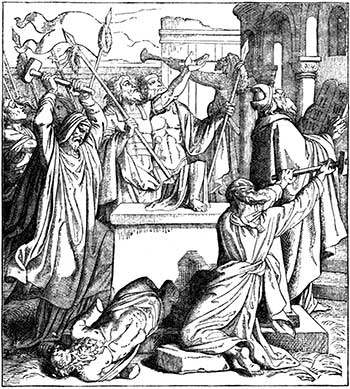
Different from all other peoples by their race, language and religion, and small in population and territory, the Israelites were on the verge of being submerged even before Christ. The best strategy for the supporters of the “politique de la main tendue” [pacifists] in the Old Law was not to resist, but to give in. Hence, the adaptation of the Chosen People to the Gentile world, the surreptitious penetration of strange doctrines into the Synagogue, the formation of a priesthood without fiber, without a spirit of sacrifice, willing to do anything to vegetate peacefully in the shadow of the Temple, and the propensity of an immense majority of Jews to follow this policy.
The leaders of this tendency occupied everything, invaded everything and dominated everything. With the epic of the Maccabees, the influence of the supporters of Israelite integrity had ended. At the time of Christ, these were only a few chosen men, who here and there sighed and wept in the shadows, waiting for the Day of the Lord. The others opened their arms to the dominating enemy. The Chosen People had also fallen under the Roman yoke. It was also an end. Night, the moral night of the obscuring of all truths, of all virtues, had descended upon the entire world, Gentiles and Synagogue.
It was in this accumulation of evils, in this environment opposed to all good, that the holiest of creatures was born, the Full of Graces, whom all nations would call blessed. This was already, in general terms, the situation at the time when the Blessed Virgin came into the world.
Regina Sanctorum Omnium
The scope of an article such as this does not allow for a detailed description of the moral framework of the Roman world. In fact, this would not be very necessary, since it is generally well known. Throughout the Empire, national aristocracies in the last stage of moral decay mingled with adventurers who had become rich in business, politics or war, with freedmen who had been brought to the height of influence by favoritism, with famous actors and athletes, in a life of uninterrupted pleasures. These pleasures brought all their softness to the decadent, all their insatiable and unbridled appetites to the adventurers and all the atmosphere of flattery, insolence, intrigue, falsehood and politicking to the favorites, the actors and the athletes. Augustus, during whose reign Jesus Christ was born, tried in vain to halt the pace of all these abuses that were tending to become alarmingly established in his time. He achieved nothing lasting.
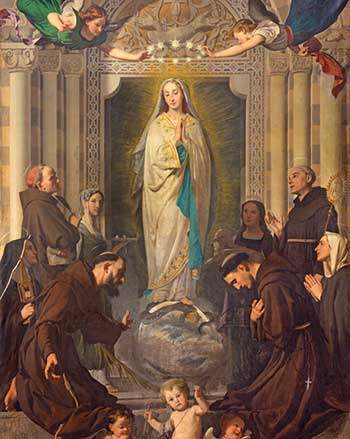
In contrast to this elite—if that is what it can be called—there was an innumerable world of slaves from all nations, of miserable manual workers, corrupted by the weight of their own vices and by the examples given from above. Hungry, mistreated, greedy and idle, they wanted to depose their masters, less because of the indignation caused by their excesses than because of the regret of not being able to lead the same life as them. In short, it is a whole picture that one does not need to be very cultured to know, nor very refined to feel in its vital reality because it does not differ significantly from the dark days in which we live.
Now, while this was the ancient world, who was the Blessed Virgin, whom God created in that time of omnipresent decadence? She was the most complete, uncompromising, categorical, irrefutable and radical antithesis of the time.
Human vocabulary is not sufficient to express the holiness of Our Lady. In the natural order, the saints and doctors of the Church compare her to the sun. But if there were any star inconceivably brighter and more glorious than the sun, that is the one to which they would compare her. And they would end up saying that this star would give a pale, defective and insufficient image of her. In the moral order, they affirm that she far transcended all the virtues, not only of all the distinguished men and matrons of antiquity but— what is immeasurably more— of all the saints of the Catholic Church. Imagine a creature with all the love of Saint Francis of Assisi, all the zeal of Saint Dominic de Guzmán, all the piety of Saint Benedict, all the recollection of Saint Teresa, all the wisdom of Saint Thomas, all the fearlessness of Saint Ignatius, all the purity of Saint Aloysius Gonzaga, the patience of Saint Lawrence, the spirit of mortification of all the anchorites of the desert: she would not come close to Our Lady.
Furthermore, the glory of the Angels is incomprehensible to the human intellect. Once, a saint’s guardian angel appeared to him. His glory was so great that the saint thought it was God Himself and was about to worship him when the angel revealed who he was. Now, guardian angels do not usually belong to the highest celestial hierarchies. And the glory of Our Lady is immeasurably above that of all the angelic choirs. Could there be a greater contrast between this masterpiece of nature and grace, not only indescribable but even inconceivable, and the swamp of vice and misery that was the world before Christ?
Because she loved God without measure, Our Lady correspondingly loved with all her Heart all that was of God. And because she hated evil without measure, she hated Satan without measure, his pomps and his works, the devil, the world and the flesh.
The Immaculate Conception
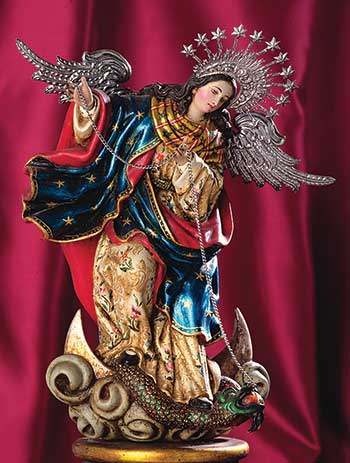
To this creature beloved above all, superior to everything that was created and inferior only to the Most Holy Humanity of Our Lord Jesus Christ, God conferred an incomparable privilege, which is the Immaculate Conception.
By virtue of original sin, human intelligence became subject to error, the will was inclined to weakness, the sensibility was prey to unbridled passions. The body was, so to speak, put in revolt against the soul.
Now, by the privilege of her Immaculate Conception, Our Lady was preserved from the stain of original sin from the first moment of her being. And so, everything in her was profound, perfect and imperturbable harmony. Her intellect, never exposed to error, endowed with an understanding, clarity and inexpressible agility, enlightened by the highest graces, had an admirable knowledge of the things of Heaven and earth. Her will, docile in everything to the intellect, was entirely turned toward the good and completely governed her sensibility, which never felt within itself nor asked of her will anything that was not fully just and in accordance with reason. Imagine a will naturally so perfect, a sensibility naturally so irreproachable, enriched and super-enriched with ineffable graces, to which she perfectly corresponded at every moment. One can have an idea of who the Blessed Virgin was. Or rather, one can understand why one is not even capable of forming an idea of who the Blessed Virgin was.
“Inimicitias ponam”
Endowed with so many natural and supernatural lights, Our Lady certainly knew the infamy of the world in her days. Because of this, she suffered bitterly. For the greater the love of virtue, the greater the hatred of evil. The Latin “Inimicitias ponam” means “I will put enmity,” the words used by God in Genesis to speak of the enmity that would exist between the devil and Our Lady, “the woman.”
Now, Mary Most Holy had within herself depths of love for virtue, and therefore she necessarily felt within herself depths of hatred for evil. Mary was, thus, an enemy of the world, from which she lived apart, separated without any mixture or alliance, focused solely on the things of God.
The world, for its part, seems neither to have understood nor loved Mary. For there is no record of it having paid her the admiration commensurate with her most chaste beauty, her most noble grace, her most sweet manner, her ever persuasive and accessible charity, more abundant than the waters of the sea and sweeter than honey.
How could it not be so? What understanding could there be between she who was entirely of Heaven, and those who lived only for the earth? She who was all faith, purity, humility, nobility, and those who were all idolatry, skepticism, heresy, concupiscence, pride, vulgarity? She who was all wisdom, reason, balance, perfect sense of all things, absolute temperance without stain or shadow, and those who were all disorder, extravagance, imbalance, wrong sense, cacophonous, contradictory, gaudy about everything, and chronically, systematically and vertiginously increasing intemperance in everything? She who was of a faith led by an adamantine and inflexible logic to all its consequences, and those who were led by error, of an infernally inexorable logic, also to its ultimate consequences? Those who, renouncing all logic, voluntarily lived in a swamp of contradictions, in which all truths were mixed and polluted in the monstrous interpenetration of all the errors that are contrary to them?
“Immaculate” is a negative word. Etymologically, it means the absence of stain and, therefore, of any and all error, however small, of any and all sin, however slight and insignificant it may seem. It is absolute integrity in faith and virtue. It is, therefore, absolute, systematic, irreducible intransigence, the complete, profound, diametrical aversion to every kind of error or evil. Holy intransigence in truth and good is orthodoxy and purity, as opposed to heterodoxy and evil. Because she loved God without measure, Our Lady correspondingly loved with all her Heart all that was of God. And because she hated evil without measure, she hated Satan without measure, his pomps and his works, the devil, the world and the flesh. Our Lady of the Immaculate Conception is Our Lady of holy intransigence.
True Hate, True Love
For this reason, Our Lady prayed without ceasing. As is so reasonably believed, she asked for the coming of the Messiah and the grace of being a servant of the one who would be chosen as the Mother of God. She asked for the Messiah so that He would come to make justice shine again on the face of the earth, so that the Divine Sun of all virtues would rise and dispel the darkness of impiety and vice throughout the world. Our Lady certainly desired that the just living on earth would find in the coming of the Messiah the fulfillment of their desires and hopes, and that from every country, from every abyss, souls touched by the light of grace would soar to the highest peaks of holiness. For these are par excellence the victories of God, who is Truth and Good, and the defeats of the devil, who is the head of all error and all evil.
The Virgin wanted the glory of God through this justice which is the realization on earth of the order desired by the Creator. But, in asking for the coming of the Messiah, she was not unaware that He would be the Rock of Scandal, through which many would be saved, and many would also receive the punishment of their sin. This punishment of the unrepentant sinner, this crushing of the obsessed and hardened wicked, Our Lady also desired with all her Heart, and it was one of the consequences of the Redemption and the foundation of the Church, which she desired and asked for like no other, “Ut inimicos Sanctae Ecclesiae humiliare digneris, Te rogamus, audi nos” (That Thou wouldst vouchsafe to bring low the enemies of holy Church, we beseech Thee to hear us), the Liturgy sings. And before the Liturgy, the Immaculate Heart of Mary certainly raised a similar plea to God for the defeat of the unrepentant wicked.
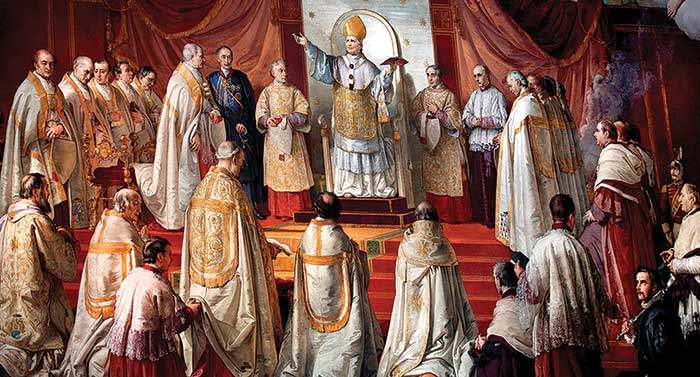
Supplicant Omnipotence
God wants works. He founded the Church for the apostolate. But above all, He wants prayer. For prayer is the condition for the fruitfulness of all works. And He wants virtue as the fruit of prayer.
Queen of all the apostles, Our Lady is, however, above all, the model of souls who pray and sanctify themselves, the North Star of all meditation and interior life. She was endowed with immaculate virtue and always did what was most reasonable. If she never felt within herself the agitations and disorders of souls who love only action and agitation, she never experienced within herself the apathy and negligence of weak souls who make their interior life a shield to disguise their indifference to the cause of the Church. Her withdrawal from the world did not mean a lack of interest in the world. Who has done more for the wicked and sinners than she who, in order to save them, voluntarily consented to the cruelest immolation of her infinitely innocent and holy Son? Who has done more for men than she who accomplished in her days the promise of the Savior?
Trusting above all in prayer and the interior life, did not the Queen of Apostles give us a great lesson in the apostolate, making both her main instrument of action?
Application to Our Days
So valuable in the eyes of God are the souls who, like Our Lady, possess the secret of true love and true hate, of perfect intransigence, of incessant zeal, of the spirit of complete renunciation, that it is precisely they who can attract divine graces to the world.
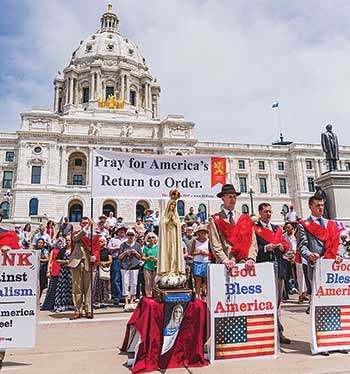
We live in a time similar to that of the coming of Jesus Christ to earth. In 1928, the Holy Father Pius XI wrote that “These things in truth are so sad that you might say that such events foreshadow and portend the ‘beginning of sorrows,’ that is to say of those that shall be brought by the man of sin, ‘who is lifted up above all that is called God or is worshipped’” (2 Thess. 2:4). (Encyclical Miserentissimus Redemptor, May 8, 1928.)
What would he say today?
Now, what is our duty? We must fight in all permitted fields, with all lawful weapons, but first and foremost, trust in our interior life and in prayer. This is the great example of Our Lady.
The example of Our Lady can only be imitated with the help of Our Lady. And the help of Our Lady can only be obtained with devotion to Our Lady. Now, what better devotion to the Blessed Virgin Mary is there than to ask her, not only for love of God and hatred of the devil, but for that holy integrity in the love of good and hatred of evil, in a word, that holy intransigence which shines forth so much in her Immaculate Conception?
Note: Translated and adapted from Catolicismo , No. 45, September 1954 (For the 100th anniversary of the proclamation of the Dogma of the Immaculate Conception in 1954, the Brazilian monthly Catolicismo published the above article by Professor Plinio Corrêa de Oliveira. As a fervent Marian devotee and a professor of history, Professor Corrêa de Oliveira gave a unique and timeless perspective that we present to our readers on the occasion of this glorious dogma’s 170th anniversary.)



